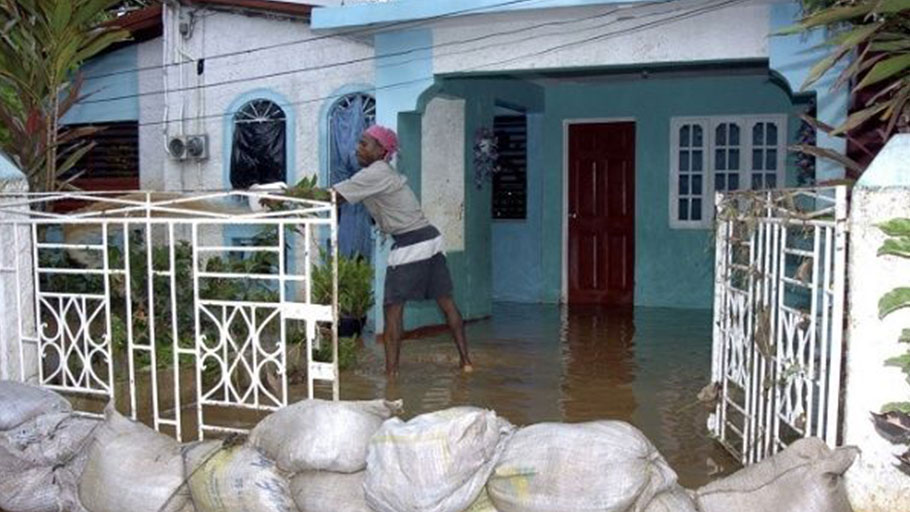A man drains water from his house flooded after the passage of Hurricane Dennis in the city of Kingston, Jamaica. Photo: EFE
By: Tina Renier —
Poor economic opportunities and poverty create a ripple effect of other social problems such as crime and violence.
A well-renowned Jamaican reggae singer, Bob Marley once sang, “many more will have to suffer… many more will have to die… don’t ask me why”. ‘Natural Mystic’ is not just a grand spectacle of entertainment. ‘Natural Mystic’ symbolically describes a contemporary world that is plagued by war, disease, poverty, hunger, growing inequalities, economic crises, realpolitik and environmental degradation. When these problems unfold before our eyes daily, we cannot desist from the belief that the world is plunging further into anarchy.
We frequently use the term ‘anarchy’ to express social disorder, lawlessness and political instability. The term ‘anarchy’ was used several times in opinion articles that were submitted to the Jamaica Gleaner in order to highlight the exorbitant levels of crime and violence in Jamaica and the calls for more pro-active crime-fighting solutions. Additionally, the term ‘anarchy’ was the most profound concept that has been emphasized throughout Robert Kaplan’s 1994 classic journal article, ‘The Coming Anarchy’. Kaplan (1994) provided an extensive predictive analysis of contemporary issues in international relations by opening his discussion with the scenario of youth gangs seizing the property and assets of political officials in Sierra Leone; as a result of poor governance and lack of equal opportunities.
He further delved into the monstrous consequences of persistent underdevelopment in particular regions where health and food insecurity becomes unbearable. While we rest our deepest fears on the bed of utopian aspirations for a better world, we will be forced to gradually acknowledge several harsh realities. We will be forced to gradually acknowledge that self-interests will always overrule collective values and we will be forced to gradually acknowledge that anarchy is deliberately manufactured in the chess board game of global politics.
The findings of the 2017 Oxfam International Report entitled ‘The Economy for the 99 percent’ exposed the fallacies of neo-liberal economic development. The report outlined that the bottom ten per cent (10 percent) earned less than US$3 in year between 1988-2011 while the incomes of the top one per cent (1 percent) increased 182 times as much. These alarming statistics can be attributed to the fact that neo-liberalism is an unseen, violent force that sees development as a means to an end.
Development as a means to end ranges from the humanitarian crisis of famine in South Sudan and Yemen, child labour in the farms of Togo, environmental disasters in the Caribbean and Latin America, discriminatory sentiments against minorities, unequal power relations among men and women, strikes for better salaries and decent work and limited access to public facilities such as health care, education, housing, clean drinking water and social security. In a time of neo-liberal hegemony where difference is dangerous and alternative views are silenced, we need to revisit the importance of the Capabilities Approach to Development which was discussed by Nobel Peace Prize Winner for Economics, Amartya Sen in his book ‘Development As Freedom’.
Amartya Sen (1999) warned us that development must not be seen as a mere means to end but rather it should be seen as process of expanding real freedoms that people should enjoy while removing major sources of unfreedom. He also cited that poverty, tyranny, poor economic opportunities, marginalization, neglect of public facilities and repression as major sources of unfreedom. Sen has observed the growing unequal wealth and income distribution despite the high levels of economic growth and productivity. Hence, the neo-liberal hegemony is deceptive because the prosperity that it promises is not congruent with the war waged against humanity through a rigid, oligarchic exercise.
Poor economic opportunities and poverty create a ripple effect of other social problems such as crime and violence. This is quite applicable to Jamaica where the nation is gaining local and international attention over the management of its national security issues where citizens are extremely concerned about the sharp spike in murders, political ineptness of the state and the recent travel advisory to tourists that was issued by the United States of America. Crime in Jamaica stems from a wide variety of issues but the most outstanding factors are poor economic opportunities, marginalization and poverty.
These factors are legacies of the plantation institution in which ownership, wealth and production has been dominated by a few individuals based on social class and skin colour. Political independence has not transformed the organization of the economy and other social institutions but has instead perpetuated the powerlessness of vulnerable groups of people in society. As a result, powerlessness is translated into violence. The 2014 Latin American Public Opinion Project Survey shared that Jamaica’s inequality rate using the Gini Co-efficient Index stands at 59.6, one of the highest rates in Latin America and the Caribbean.
The stark paradoxes of Jamaica’s development predicament was announced by market studies analyst, Don Anderson who explained that while economic indicators are at an all-time high for the business class in Jamaica, poverty has doubled since 2006. Listening to Anderson’s commentary on Television Jamaica (TVJ) has helped me to realize that the logic of the market has been fully embraced and incorporated without deft examination or criticism.
On the contrary, while Sen has advocated for individual participation in the market to achieve economic freedom, he also argues that the market needs effective regulation from the state in order to ensure equity. Equity, according to Sen, is an organizing principle that enables the expansion of freedoms for people despite their differences but, are we serious in our commitment to building a more just and equitable world or is it another grand rhetoric echoed at public conferences and summits?















